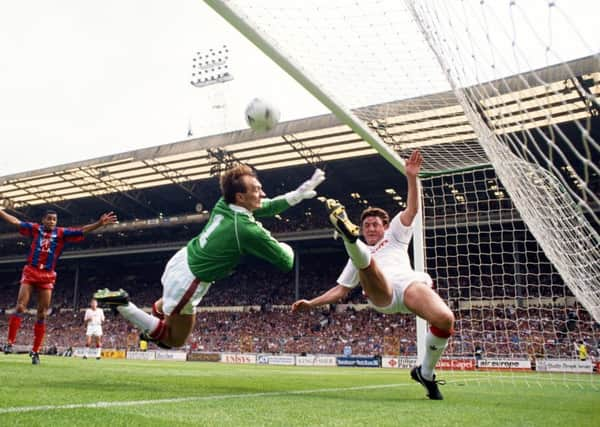Jim Leighton's long road back from Wembley misery


Imagine he is dropped for the replay – and you really will have to imagine this, since replays don’t happen these days. Imagine United then win the trophy thanks in part to a terrific performance by De Gea’s understudy.
Finally, imagine De Gea, after such a damaging blow, seeking to re-ignite his career at a club in the Scottish second tier, Hibs say – or Raith Rovers.
Advertisement
Hide AdAdvertisement
Hide AdSounds crazy, doesn’t it? But that’s effectively what happened 26 years ago in the case of Jim Leighton, whose name, and that of his replacement, the late Les Sealey, dominate memories of the last time Manchester United met Crystal Palace on this stage.
The claim that Leighton never recovered from the devastation of being dropped for such a high-profile match is a calumny. But it was a long road back.
Indeed, Leighton’s career deserves to be celebrated because he effectively had two of them; pre-12 May 1990 and post-12 May 1990. The former spell lasted more than a decade and included three league titles, four Scottish Cups, a League Cup and, of course, a European Cup-Winners’ Cup, followed by a Super Cup.
His “second” career didn’t include an FA Cup final winner’s medal. It brought only a Scottish First Division championship medal in the way of tangible honours. But it saw Leighton return from the dead to reach the best form of his career for Hibs, Aberdeen (again) and Scotland.
It was one of the biggest days in Scottish football history when Scotland opened the 1998 World Cup against holders Brazil, at the Stade de France. It was a hugely redemptive occasion for Leighton, who had won another battle to wrest the No 1 shirt from Andy Goram. Eight years on from his Wembley misery, Leighton, then aged 39, felt he had finally achieved the right to flick a metaphorical two fingers at Alex Ferguson.
This was a gesture Ferguson accused Leighton’s then wife Linda of aiming at him after the FA Cup final replay, which United won 1-0. “That stung,” Ferguson wrote in his autobiography [Leighton has since denied this ever happened].
“A lot of people in Aberdeen get disappointed and annoyed when I say the Scotland v Brazil game was the biggest match in my career,” Leighton told me in 2012, in a rare interview. “But I won’t go back on that. To go from Dundee reserves to playing v Ronaldo, Carlos and Cafu, and the route that I took, it was a lot more rewarding the second time around.”
Dundee reserves. This is when Leighton’s career really took a nosedive. As he said: “It’s one thing being dropped by Manchester United, it is quite another to be dropped by Dundee.” There was even a story of him being forgotten by the Dundee reserves team bus before one game.
Advertisement
Hide AdAdvertisement
Hide AdHe had kept his word to sign for First Division Dundee in 1992 despite late interest from Werder Bremen, who went on to win the Cup-Winners’ Cup that season. He was unveiled on the same day as Simon Stainrod.
“Two big names, one ego,” Leighton told me dryly, with reference to how their relationship became strained when Stainrod, who was soon named player-manager, banished him to the reserves in favour of then rookie keeper Paul Mathers.
It was a case of seemingly irreversible decline sparked by Ferguson making the toughest decision of his career. As he later put it, it was either him or Leighton. In his fourth season as manager at Old Trafford, Ferguson was under pressure to win his first trophy. Noting how broken Leighton looked after the 3-3 draw in the first game – the goalkeeper was criticised for the first and third Palace goals – he resolved to replace him with Sealey, then only on loan from Luton Town.
Ferguson later deepened the rift that developed between him and Leighton when he made some bruising remarks in Managing My Life, published in 1999.
“To put it bluntly, I believe Jim was selfish,” he wrote. “As far as I am aware, not once did he hold his hands up and take any blame.” Their relationship, Ferguson knew by then, was beyond saving anyway. They haven’t spoken since, not even at a match v Manchester United in 2008 to mark the 25th anniversary of Aberdeen’s Cup-Winners’ Cup success.
So much was lost as a consequence of Ferguson’s cold-eyed decision, including Leighton’s likely status as Scotland’s most capped ever player. If it had not been for his wilderness years between 1990 and 1994, he would surely have won more than Kenny Dalglish’s record 102 caps. Leighton made a hugely impressive 91 Scotland appearances in any case.
But the story is also tinged by personal tragedy. Sealey died suddenly aged just 43 in August 2001. Leighton was a pall bearer at his funeral. This underlined how, despite everything, one relationship between two of the main protagonists was deepened by the circumstances surrounding the 1990 FA Cup final.
“Les gave me his winner’s medal,” recalled Leighton. “I gave it back to him. I actually qualified for a medal by playing in the first game. But I sent it back. Unless I could walk up there and collect it myself having played the game, I was not interested. I sent it back to the club and told them to send it back to the FA. I didn’t want charity.”
Advertisement
Hide AdAdvertisement
Hide AdLeighton deserves to be remembered as an-all time great, even if his Manchester United days ended so sourly. Today’s FA Cup final is a good reason to salute his perseverance, and undoubted brilliance, all over again.
Now 57, Leighton’s football career is in another period of abeyance after this very private person left his position as goalkeeper coach with Aberdeen for a second time last year, and without fanfare.
Will he even watch today’s final at Wembley on television? You very much doubt it.